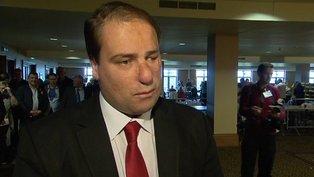Nulty: Labour conference offers opportunity for policy shift

Ahead of the Labour Party's national conference in Galway this weekend, Labour TD for Dublin West and Swords, Patrick Nulty writes that his party's identity has been "somewhat eroded" since it entered government. Motions being put to party delegates, if passed, "will signal to the leadership that a new direction is required", Nulty writes.
The public are now often very cynical about the conferences of the main parties. They suspect that the events are staged managed, messages massaged for media headlines and dissent side-lined.
The mainstream media itself has a role to play in creating this cynicism. Often, the voices of party members and backbench TDs are ignored, and the focus is purely on the leading party personalities.
This is a mistake. The Labour Party centenary conference has 159 motions on the agenda. The motions, if listened to by the party leadership, represent a call to action for a return to an economic policy which priorities economic growth, job creation and measures to reduce inequality. This is an agenda which would not only rally support from Labour voters, but give hope to the many who now see the austerity agenda as failing.
At the 2009 Labour Party conference, Eamon Gilmore delivered a message to the public that the cuts, then being implemented by Fianna Fail and the Greens, would not actually lead to the government deficit being reduced. He argued for an expansionary economic policy, focusing on job creation and economic stimulus. The message was widely applauded by the public. It differentiated Labour from Fianna Fail and Fine Gael leading to Labour's poll ratings soon taking off.
Eamon Gilmore's warning that those who had championed the neo liberal politics which had failed Ireland had no solutions now, found an echo from the many who suspected that they were sold a Celtic pup rather than a Celtic tiger.
3 years on, Labour's identity as a party championing a radical agenda has been somewhat eroded.
The motions to this year's Labour Party conference offer hope for a return to an agenda which recognises that we have a crisis in the public finance, but that this is one which can only be filled by creating employment and adjustments on what the governments takes in, rather than the amount its spends.
Let's be clear-this is not an ideological position being pushed by the left with no evidence attached. The ESRI working paper on fiscal adjustments across the EU, available here, makes the point that the economies which have re-adjusted their deficits by changes on the amount they take in rather than the amount they spend have recovered faster and better than those who like Ireland, are focusing the bulk of their adjustments on spending cuts.
Among the motions at the conference which, if passed, will signal to the leadership that a new direction is required, are a series of motions to introduce a 3rd rate of tax for those earning over €100,000 euro a year and motions calling for the introduction of a wealth tax.
These proposals are not only fair but economically coherent. Recent CSO figures have shown how low and middle income earners have borne the brunt of fiscal adjustments to date. Taking from those with less disposable income to spend is strangling domestic demand, in a way which will not happen if you take from those who already have a large disposable income.
Michael Noonan speaking in the Dáil last year revealed that a wealth tax would, following the French model, yield € 500 million euro a year. In a parliamentary response to me, he revealed that a 10% increase in capital acquisitions tax and capital gains tax would yield € 276 million a year. Contrast this with the approximately € 80 million raised to date on the unfair Household tax.
Labour members, by seeking a future where tax is yielded fairly, prioritising investment in job creation and acknowledging the failure of cuts to dent the budget deficit, have a distinct agenda which would greatly help Labour re-establish its identity. They ought to be listened to now.
